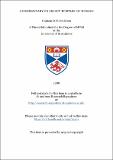A commentary on select 'Epistles' of Horace
Abstract
Horace's first book of Epistles comprise twenty poems which purport to be written by him to persons of varying ages and stations in life. They are not real letters, but rather are so shaped as to give the flavour of a letter. However, while they are artfully contrived, there is no reason to doubt that each addressee was a real person, and it is the clear personal element which is one of their most attractive features. I have selected two epistles which well illustrate Horace's capacity to relate to other people, while at the same time revealing something of his own self. Epistle l.4- shows his concern for his contemporary and fellow poet, Tibullus, and culminates in the carpe diem advice which Horace had expressed often in his Odes 1-3, published prior to the Epistles. His invitation to Tibullus recalls the sympotic motif familiar in many Odes where reflections on the shortness and precariousness of life lead to a summons to enjoy the present positively. Sociability and friendship will bring Tibullus out of himself. Repeatedly in the Epistles we see Horace stressing the value of friendship, and it is this aspect of human relations which reveals something of the poet's own sense of values and priorities. In contrast to the whimsical and gently teasing tone of Ep. 1.4 (where Horace is dealing with a social equal and cultured figure from the literary world) to his vilicus shows Horace as the master dealing with a recalcitrant slave who is dissatisfied with his posting to the country. Horace firmly encourages him to a more reasonable view of his position and superbly shows his versatility in adapting his style and language to the level of a mere slave and social inferior. The theme of discontent with one's lot recalls several Odes, while the city versus country theme recurs in several Epistles, notably 1.7 and 1.10, it recalls one of his favourite themes of the 30's; cf. Sat. 2.6 and Epode 2 where Horace yearned for the countryside, and a life of leisured otium. Both Epistles demonstrate the range of Horace's correspondence, and his prescription for bringing his addressees to an awareness of the best way to happiness and contentment.
Type
Thesis, MPhil Master of Philosophy
Collections
Items in the St Andrews Research Repository are protected by copyright, with all rights reserved, unless otherwise indicated.

